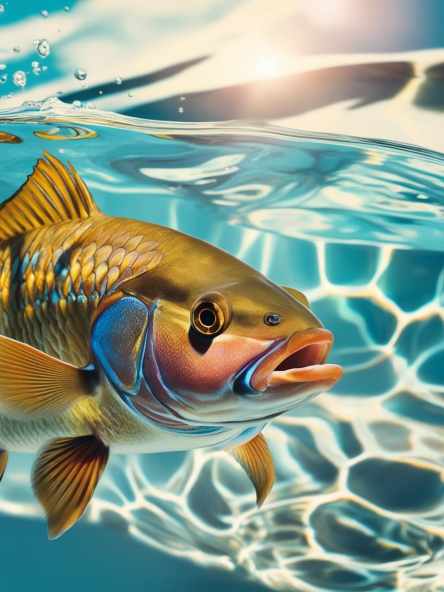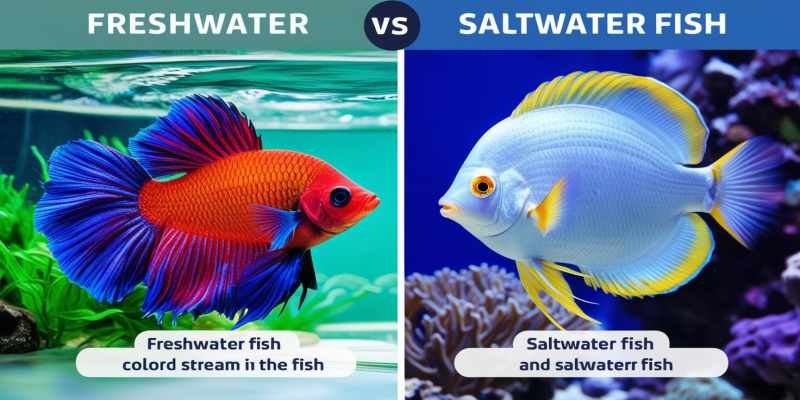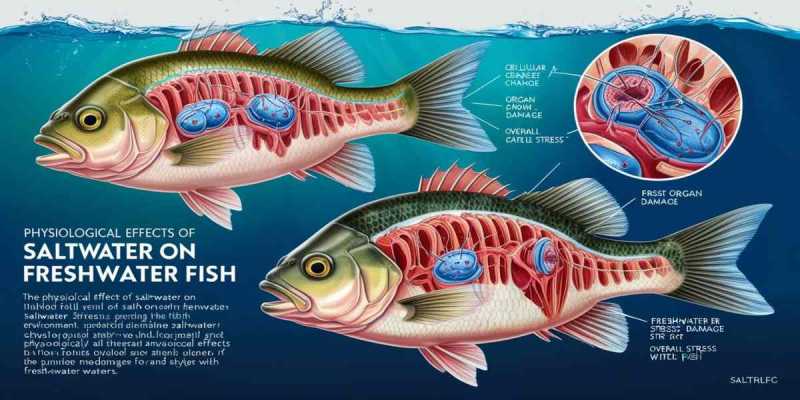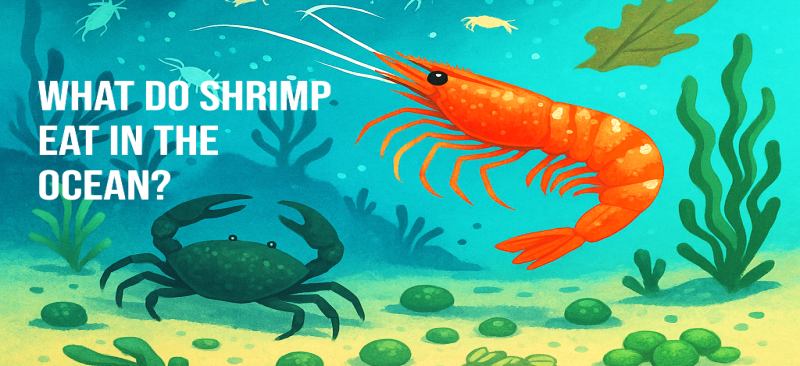Many hobbyists debate Freshwater Fish vs Saltwater Fish in terms of color, behavior, and compatibility but in this article we will discuss total top 9 difference between fresh water fish and saltwater fish. if you Have ever wondered about the difference between freshwater and saltwater fish or you are interested in learning about fishkeeping, fishing, or aquatic life, this detailed article is absolutely for you.
It may seem obvious, one species lives in rivers and lakes, the other in oceans, but the actual truth is much deeper than that.
From their environment to their personality, coloration, care needs, their biology, and even how they taste on your plate, Freshwater Fish vs Saltwater Fish is a comparison that is worth knowing. In this post, we will explain it all in simple terms to help you figure out which fish best suits your interest, hobby, or dinner plate.
What is the difference between saltwater and freshwater?
The basic difference between saltwater and freshwater is their salinity and habitat characteristics. This is need to be understand first if we need to know the difference between fresh water fish and saltwater fish.
- Salinity:
Freshwater: Has a low salt concentration, typically less than 1%. This includes rivers, lakes, ponds, and streams.
Saltwater: Contains a higher concentration of salt, usually about 3.5% salinity, found in oceans and seas. - Habitat:
Freshwater: These ecosystems are typically found inland and include various bodies of water like lakes, rivers, and wetlands.
Saltwater: These bodies exist primarily in coastal areas and open oceans, characterized by their vast size and depth. - Adaptability of Organisms:
Freshwater species are usually more tolerant of temperature and water chemistry changes, while
Saltwater species are typically more sensitive to environmental changes due to their specific adaptations to saline conditions. After this let us understand the saltwater fish vs freshwater fish biology.
After knowing about the water difference. When comparing Freshwater Fish vs Saltwater Fish, the main differences lie in their adaptability, tank requirements, and cost of maintenance. Let we understand them one by one.

🐠 What Exactly Are Freshwater Fish?
Freshwater fish live in bodies of water with low salinity, such as rivers, lakes, ponds, and streams. These places typically have a salinity of less than 1%.
There are a large number of species of freshwater fish, which vary in size, shape, and behavior. Some popular examples include trout, bass, catfish, and goldfish.
In addition to their ecological importance, freshwater fish are important in human activities as fishing, aquaculture, and as pets in home aquariums.
🌊 What About Saltwater Fish?
Saltwater fish, as their name suggests, live in oceans and seas where the salinity is much higher. The salt level is much higher than normal fresh water. These fish often boast intense colors and striking shapes, and if you’ve ever seen a reef tank, you know how captivating they can be.
Popular saltwater species include:
- Clownfish (like Nemo!)
- Blue Tang (remember Dory?)
- Lionfish, Wrasses, and Butterflyfish
While saltwater fish are gorgeous, they tend to need more care, special equipment, and patience. They’re usually best for aquarists with little experience or who are ready to invest time and money.
Freshwater Fish vs Saltwater Fish
Here’s a quick breakdown of how these two types of fish differ:
| Feature | Freshwater Fish | Saltwater Fish |
| Habitat | Rivers, lakes | Oceans, seas |
| Water Salinity | Low (<0.05%) | High (~3.5%) |
| Aquarium Cost | Lower | Higher |
| Color Variety | Moderate | Often very vibrant |
| Maintenance Level | Easier | Complex |
| Hardiness | More tolerant of changes | Sensitive to water quality |
| Diet | Insects, plants, small crustaceans | Algae, small fish, invertebrates |
| Freshwater Fish vs Saltwater Fish Taste | Stronger in Taste | Sweet in Taste |
| Freshwater Fish vs Saltwater FishHealth Benefits | Much beneficial to health | Less but still healthier |
🧭 Related Articles You May Like:
freshwater fish vs saltwater fish osmoregulation

🎣 Fishing: Which Is More Delight?
Both freshwater fishing and saltwater fishing have their thrills.
- Freshwater fishing can be done in rivers and lakes — it’s often peaceful, easy to access, and perfect for relaxed weekends.
- Saltwater fishing brings bigger catches and more excitement — but you may need a boat, tougher gear, and a bit more stamina.
If you’re after a fight and a trophy catch, saltwater might be your game. But for a calm afternoon with family or friends, freshwater wins.
How can I find or identify local freshwater and saltwater fishing spots?
Finding local freshwater and saltwater fishing spots can be an enjoyable adventure. Here are some effective ways to identify and locate these fishing areas:
1. Online Resources and Maps:
Fishing Websites: Websites like Fishbrain, Fishidy, or local fishing forums often provide detailed maps and user-generated reports of fishing spots.

State Wildlife Agencies: Many state or provincial wildlife departments have websites with lists of freshwater and saltwater locations, including public fishing areas and access points.
2. Social Media and Online Forums:
Join local fishing groups on platforms like Facebook or Reddit, where anglers share their favorite spots and tips. Sites like Instagram or YouTube can also showcase popular fishing locations.
3. Fishing Licenses and Regulations:
When obtaining your fishing license, check out any accompanying guides or maps. These often include designated fishing areas.
4. Local Bait and Tackle Shops:
Visit local bait shops, as they are often a treasure trove of information about the best nearby fishing spots. Plus, shop owners can provide insights on what fish are biting and where.
5. Community Boards and Recreation Centers:
Look for bulletin boards in community centers or recreational facilities. They may have postings about local fishing events or popular fishing locations.
6. Ask Fellow Anglers:
Engaging with local fishing communities can be especially helpful. Speak with fellow anglers at parks or popular fishing sites to gain recommendations and tips.
7. Mobile Apps:
Consider downloading fishing apps such as Navionics or Fishidy, which provide GPS coordinates and maps of fishing spots.
8. Explore Natural Bodies of Water:
Take the time to explore rivers, lakes, and coastlines in your area. Pay attention to any signs indicating public access or fishing opportunities.
9. Fishing Competitions and Events:
Consider attending fishing tournaments or events in your area. Not only can you learn more about the local fish species, but you might also get advice from experienced fishermen.
By combining these strategies, you should be able to find great local freshwater and saltwater fishing spots tailored to your preferences! Happy fishing!
🏡 Aquarium Choice: Freshwater Fish vs Saltwater Fish
If you’re starting a new aquarium, understanding Freshwater Fish vs Saltwater Fish will help you choose the right habitat for your space and budget. Hence the type of fish you choose makes a huge difference.
🐟 Freshwater Tanks:
- Easier to set up and maintain
- Fish are more forgiving of water fluctuations.
- Equipment is budget-friendly
- Best for kids and beginners
🐠 Saltwater Tanks:
- More eye-catching and colorful
- Can include corals and reef life
- Requires special lighting, salt mixes, and testing kits
- Ideal for passionate hobbyists
What is the difference between saltwater and freshwater fish taste?
Saltwater fish tend to have a stronger, more savory flavor, while freshwater fish usually taste milder and sweeter. This is mainly because of the differences in their habitat and diets.
Flavor highlights:
- Saltwater fish like snapper, tuna, and mackerel are rich in flavor and often contain more omega-3 fatty acids.
- Freshwater fish like trout, tilapia, and catfish are lighter, making them perfect for gentle seasoning or grilling.
Saltwater fish taste much stronger but which one is better than the other depends on your taste. After this let we know the Freshwater fish vs saltwater fish health benefits.
Freshwater fish vs saltwater fish health benefits
Consuming saltwater fish is more beneficial to the health. It has various benefits for the human body, like the heart, skin, immunity etc. Let us understand the freshwater fish vs saltwater fish health benefits now.

- Higher Omega-3 Fatty Acids:
Saltwater fish, such as salmon, mackerel, and sardines, are high in omega-3 fatty acids, which are known to help heart health, reduce swelling, and improve brain function. Omega-3s are essential because human body can not produce it on its own, in diet it is very essential. - Strong Flavor and High Nutrient Density:
Saltwater fish have a stronger flavor, often due to their diet and habitat, which includes higher levels of marine algae and other nutrient-dense foods. This produces high density profile for nutrients and minerals. - Lower Exposure to Contaminants:
Saltwater fish are less likely to accumulate certain freshwater contaminants, such as those found in heavily polluted lakes or rivers. However, it’s worth noting that larger saltwater fish can have higher levels of mercury and other toxins, so it’s essential to be mindful of the types of fish you consume. - Various Cooking Options:
Saltwater fish can be cooked in different styles, which encourages more people to include saltwater fish in their diets. Grilling, broiling, and baking saltwater fish can enhance flavor also sustaining health benefits. - Potential for Lower Saturated Fats:
Saltwater fish have a lower saturated fat content, while some freshwater fish have a higher value of saturated fat. Due to this, saltwater fish are good at removing unnecessary fat. This can be beneficial for those seeking to improve their heart health by reducing unhealthy fat intake.
As we know that saltwater fish have significant benefits, it’s still essential to balance your diet. So Freshwater fish, like trout and tilapia, are also healthy options that provide lean protein and beneficial nutrients, and they can be included in a well-rounded diet. You can get health benefits from both freshwater and saltwater fish.
❓ FAQ’S On Freshwater Fish vs Saltwater Fish:
Q: Are saltwater aquariums hard to maintain?
Yes. They require a stable water parameters, more equipment, and regular monitoring.
Q: Can you mix freshwater and saltwater fish?
Unfortunately, each species do not survive in mix of freshwater and saltwater. So it will be a very bad practice to mix freshwater with saltwater.
Q: Which fish are more colorful?
Saltwater fish are generally more colorful, think reef fish. But freshwater species like Bettas and Discus are also looks stunning.
✅ Final Thoughts: Which One Should You Choose?
Choosing between freshwater fish vs saltwater fish comes down to your goals:
- If you Want a simple aquarium, relaxing start? Go with freshwater.
- Ready for a challenge and love bright, colorful, exotic fish? Try saltwater.
- Fishing for fun? Do both — they each offer unique experiences.
- Choosing fish for taste? Experiment — both types are delicious in different ways.
No matter your path, understanding these two aquatic worlds will help you enjoy your fish more, whether they’re in a tank, on a line, or your plate.
💬 We’d love to hear from you!
Are you a fan of the colorful vibrance of saltwater fish, or do you prefer the hardy charm of freshwater fish? Drop a comment below and tell us your favorite fish species and why you love it. Let’s dive into the conversation together!




Pingback: What Happens to Freshwater Fish in Saltwater? [Explained] | FishioHub - FishioHub